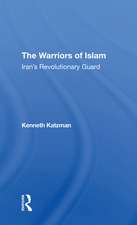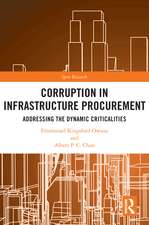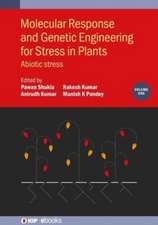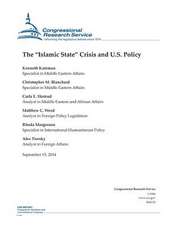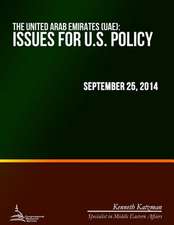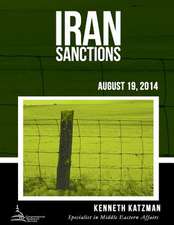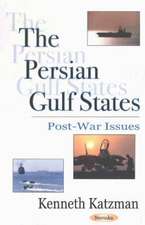Iran
Autor Kenneth Katzmanen Limba Engleză Paperback – 30 sep 2008
| Toate formatele și edițiile | Preț | Express |
|---|---|---|
| Paperback (2) | 104.09 lei 3-5 săpt. | |
| CREATESPACE – | 104.09 lei 3-5 săpt. | |
| Nova Science Publishers Inc – 30 sep 2008 | 225.10 lei 3-5 săpt. |
Preț: 225.10 lei
Preț vechi: 308.00 lei
-27% Nou
Puncte Express: 338
Preț estimativ în valută:
43.08€ • 44.81$ • 35.56£
43.08€ • 44.81$ • 35.56£
Carte disponibilă
Livrare economică 24 martie-07 aprilie
Preluare comenzi: 021 569.72.76
Specificații
ISBN-13: 9781604568455
ISBN-10: 1604568453
Pagini: 67
Ilustrații: b/w maps
Dimensiuni: 138 x 210 x 6 mm
Greutate: 0.11 kg
Editura: Nova Science Publishers Inc
ISBN-10: 1604568453
Pagini: 67
Ilustrații: b/w maps
Dimensiuni: 138 x 210 x 6 mm
Greutate: 0.11 kg
Editura: Nova Science Publishers Inc
Cuprins
Preface; Threat Assessments and U.S. Concerns; Political History; Regime Stability, June 2005 Presidential Elections, and Human Rights; Mohammad Khatemi, Reformists, and Reformist Candidates; The Hardliners, Rafsanjani, and Hardline Candidates; The Candidate Field and Results/Mahmoud Ahmadinejad; Prominent Dissidents; Anti-Regime Groups: Peoples Mojahedin Organization of Iran (PMOI); Pro-Shah Activists/Exile Broadcasts; Human Rights Record/Crackdowns on Dissent; Irans Strategic Capabilities and Weapons of Mass Destruction Programs; Nuclear Program; European Diplomatic Efforts/Agreement One; European Diplomatic Efforts/Agreement Two; Status of the Talks; Chemical and Biological Weapons; Missiles; Foreign Policy and Support for Terrorism; Persian Gulf States; Iraq; Supporting Anti-Peace Process Groups; Lebanese Hizballah; Relations with Central Asia and the Caspian; Afghanistan/Al Qaeda; U.S. Policy Responses and Legislation; Bush Administration Policy and Options; Regime Change; H.R. 282 and S. 333; Engagement?; Military Action?; International Sanctions?; U.S. Sanctions; Terrorism/Foreign Aid Sanctions; Bam Earthquake; Proliferation Sanctions; Counter-Narcotics; Trade Ban; The Iran-Libya Sanctions Act (ILSA) and Regional Oil and Gas Projects; Travel-Related Guidance; U.S.-Iran Assets Disputes; Multilateral Policies Toward Iran; Eu-Iran Trade Negotiations; Country-Specific Policies: Britain and France; Japan/Azadegan Field; Multilateral and World Bank Lending to Iran; WTO Membership; Conclusion; Index.

